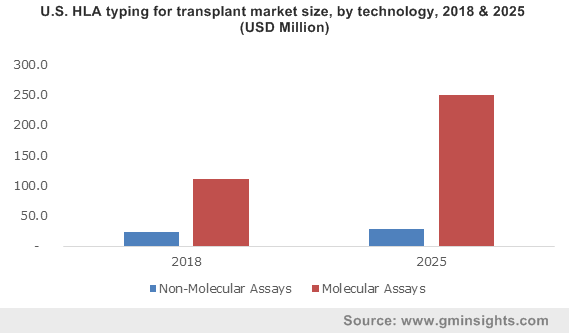HLA typing for transplant market to accrue commendable gains over 2017-2024, adoption of high tech methodologies to augment the global industry share
Publisher : Fractovia | Published Date : 2018-01-30Request Sample
Touted as an emerging niche vertical of the expansive healthcare and medical devices industry, HLA typing for transplant market has been traversing along a rather profitable growth path over the recent years. The rising utilization of cutting-edge technologies across diverse medical care institutions to correlate and identify the most appropriate transplant matches would, in all likelihood, impel HLA typing for transplant industry trends in the ensuing years. Furthermore, the ever-rising requirement for organ transplants, including both humoral and cellular immune responses, has been one of the most prominent factors to have embellished the growth potential of HLA typing for transplant industry, which garnered a total remuneration in excess of USD 330 million in the year 2016.
U.S. HLA Typing for Transplant Market size, By Technology, 2013-2024 (USD Million)

HLA typing is essentially the study of genes which are present in the genome sequence of humans and is considered of immense significance for research in drug hypersensitivity research, tissue transplantation matching, and autoimmune disease research. These genes are deemed as highly polymorphic and consist a large number of alleles which are helpful in finding foreign antigens. As a result of this complexity, analyzing these genes with other sequencing technologies has become both challenging and highly expensive for the leading players of HLA typing for transplant industry. However, considering the advantages of leukocyte antigen typing in transplants, a number of diagnostics centers, research institutions, and private players have been employing this technology on a wider scale, consequentially providing favorable impetus to the worldwide HLA typing for transplant market.
Meanwhile, it has been observed that in order to boost the revenue growth of the overall HLA typing for transplant market, renowned participants of this business space have been consistently making efforts to enhance and refine the existing technology and the prevailing standard practices. Consequentially, a host of HLA-based typing services providing firms are increasingly adopting advanced software-reliant technologies to ensure extensive commercialization of diagnostic procedures for organ transplantation. Regarded as the global leader and one of the pioneers in providing high-resolution HLA sequence-based typing services, HistoGenetics for instance has recently declared that the firm has seized a multi-year deal to perform HLA typing by utilizing PacBio® sequencing that would drive demand for several thousand samples each week over the forthcoming years. As per reliable sources, the latest contract would assist the US based firm in analyzing genetically complex samples accurately and to offer cost-effective genotyping of the HLA region, which would, in turn, propel the US HLA typing for transplant industry expansion. For the record, PacBio® sequencing is based on Single Molecule, Real-Time (SMRT) technology developed by one of the foremost HLA typing for transplant industry giants of Unites States, Pacific Biosciences, Inc.
Elaborating further, the overall HLA typing for transplant market is being increasingly symbolized by many tech firms and research institutions which are developing a range of medicinal kits and transplantation techniques. TBG Biotechnology for instance, has recently received the approval of China’s Food and Drug Administration (CFDA) for its HLA genotyping kits, under its renowned portfolio of HLAssure SE SBT, which can be utilized in HCT (hematopoietic cell transplantation). Post-approval, the Australia based molecular diagnostic firm apparently teamed up with HCT service providers in a bid to accentuate the pace of HLA typing for transplant market size expansion. According to some authentic sources, China has emerged as the leader of allogeneic HCT industry, which makes it all the more significant to increase the approval rating for HLA typing labs from CFDA. It goes without saying that such proactive developments would undeniably impel the growth prospects of China HLA typing transplant industry.
Organ transplant methods have undoubtedly assisted millions of patients over the last few decades. However, the availability of organs has been the major bone of contention, something which has concerned almost all HLA typing for transplant industry players as well. Apparently, this challenge has compelled leading industry giants invest massively to devise more precise and accurate procedures that would fill the organ deficit and further promote mass acceptance of transplantation methodologies across the world. Needless to mention, the aforementioned factors would eventually have a profound influence on the revenue portfolio of HLA typing for transplant market, which is anticipated to register a CAGR of 10 percent over 2017-2024.